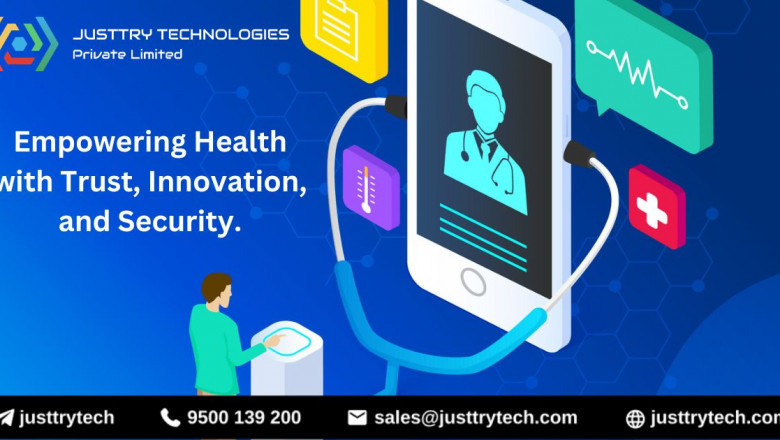views
Digital Trust: Revolutionizing Patient Care with Blockchain
In an industry where trust, security, and efficiency are paramount, blockchain technology is revolutionizing patient care by offering innovative solutions to longstanding challenges. The healthcare sector generates massive amounts of sensitive data daily, from patient records to drug supply chains, and ensuring the privacy and accuracy of this data is critical. Blockchain, with its decentralized and immutable nature, has emerged as a game-changer, enhancing digital trust and paving the way for more efficient and secure healthcare systems.
In this blog, we explore how blockchain is reshaping patient care and fostering trust in the healthcare ecosystem.
The Need for Digital Trust in Healthcare
Trust is a cornerstone of effective healthcare systems. Patients trust providers to keep their medical data private, doctors trust the accuracy of patient records, and organizations trust the integrity of the supply chain. Yet, the current healthcare landscape is plagued by issues like:
-
Data breaches: Sensitive patient information is often at risk of being stolen or misused.
-
Inefficiencies: Data silos and outdated systems make sharing information cumbersome.
-
Fraud: Counterfeit drugs and falsified insurance claims cost billions annually.
Blockchain addresses these challenges by creating a transparent, secure, and decentralized system that ensures data integrity and builds trust among stakeholders.
How Blockchain Revolutionizes Patient Care
Blockchain’s core features—decentralization, immutability, and transparency—offer transformative applications in patient care.
1. Secure and Decentralized Patient Records
-
Current Challenge: Patient records are often stored in centralized systems, making them vulnerable to breaches and unauthorized access.
-
Blockchain Solution: Patient data is stored on a decentralized ledger, ensuring that only authorized parties can access it. Patients can control who sees their data, enhancing privacy.
-
Example: A patient can grant temporary access to a specialist for a specific treatment, and the blockchain will log every access attempt for accountability.
2. Improved Data Sharing Between Providers
-
Current Challenge: Healthcare providers struggle to share patient records due to incompatible systems, leading to delays and errors.
-
Blockchain Solution: Blockchain creates a unified platform where all providers can securely access and share patient data.
-
Benefits:
-
Reduces duplication of tests and procedures.
-
Speeds up diagnosis and treatment.
-
Improves coordination in multi-provider care.
3. Combatting Counterfeit Drugs
-
Current Challenge: The global pharmaceutical industry loses billions annually due to counterfeit drugs infiltrating supply chains.
-
Blockchain Solution: Blockchain ensures every step in the supply chain is recorded immutably, from manufacturing to distribution.
-
Example: Patients and providers can scan a drug’s QR code to verify its authenticity and trace its journey on the blockchain.
4. Streamlining Insurance Claims
-
Current Challenge: Insurance claims often involve lengthy processes and disputes over documentation.
-
Blockchain Solution: Smart contracts automate claims processing by verifying conditions and executing payouts when requirements are met.
-
Benefits:
-
Reduces administrative costs.
-
Speeds up payouts.
-
Minimizes fraud.
5. Enabling Precision Medicine and Research
-
Current Challenge: Researchers face hurdles in accessing large datasets due to privacy concerns and fragmented data sources.
-
Blockchain Solution: Patients can share anonymized data with researchers securely, fostering collaboration and innovation.
-
Benefits:
-
Advances in personalized treatments.
-
Accelerated drug development.
Real-World Examples of Blockchain in Healthcare
-
MedRec: A blockchain-based system that enables secure and decentralized access to patient medical records, empowering patients to control their health data.
-
PharmaLedger: A blockchain initiative focused on improving transparency and efficiency in the pharmaceutical supply chain.
-
Guardtime: A company leveraging blockchain to secure healthcare records and ensure compliance with data protection regulations.
Benefits of Blockchain for Patients and Providers
For Patients:
-
Greater control over their medical data.
-
Enhanced privacy and security.
-
Reduced risk of receiving counterfeit medications.
For Providers:
-
Streamlined workflows with automated processes.
-
Improved collaboration across healthcare networks.
-
Access to accurate, real-time data for better decision-making.
Challenges in Implementing Blockchain in Healthcare
Despite its potential, blockchain adoption in healthcare is not without challenges:
1. Regulatory and Compliance Hurdles
Blockchain must comply with stringent healthcare regulations like HIPAA (USA) and GDPR (EU) while maintaining patient privacy.
2. Integration with Legacy Systems
Most healthcare providers rely on outdated systems that are incompatible with blockchain technology.
3. High Implementation Costs
Setting up blockchain infrastructure and training staff can require significant investment.
4. Scalability Concerns
Current blockchain networks may struggle to handle the massive volume of healthcare data efficiently.
Solutions:
-
Partnering with experienced blockchain development companies.
-
Using hybrid blockchain models that balance scalability and security.
-
Developing industry standards for blockchain implementation.
The Future of Blockchain in Healthcare
As blockchain technology matures, its applications in healthcare will continue to expand. Future developments include:
-
Decentralized Clinical Trials: Blockchain can streamline trial processes by securely storing and sharing participant data, ensuring integrity.
-
Telemedicine Integration: Blockchain can authenticate virtual consultations and securely store patient data from remote monitoring devices.
-
Tokenized Health Rewards: Patients could earn tokens for healthy behaviors, redeemable for discounts or services.
-
AI and Blockchain Collaboration: Combining blockchain with artificial intelligence to analyze patient data securely and provide personalized care.
Conclusion
Blockchain is not just a technology—it’s a tool to rebuild trust in the healthcare industry. By offering secure, transparent, and efficient solutions, blockchain has the potential to revolutionize patient care, from how records are stored and shared to how drugs are verified and insurance claims are processed.
While challenges remain, the progress made so far shows that the healthcare industry is ready to embrace blockchain’s transformative potential. With the right investments and partnerships, blockchain can redefine patient care and create a future where trust is at the heart of every interaction.






















Comments
0 comment